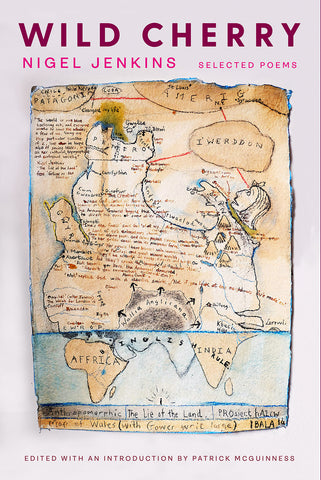Selected and introduced by Patrick McGuinness
'Nigel Jenkins has a staggering presence in the literature of Wales. His poetry is both political and beautiful, deeply human, wonderfully cosmological of often scathingly humorous. Swansea’s most amiable bard and, undoubtedly, its most popular poet since Dylan Thomas... This selected poems, edited so very well by Patrick McGuiness, is an absolute triumph!' – Nation.Cymru
'Wild Cherry is a collection that does justice to a man respected, loved, and revered for his poetry, teaching, and friendship. With McGuinness’s introduction, editing and notes, the selection here serves to direct readers to Jenkins’s wider work. It is a collection destined to become a bookcase staple within the world of Welsh poetry.' – Liam Nolan, Gwales (A review from www.gwales.com, with the permission of the Books Council of Wales.)
'clear, pure, lucid, light, and accessible ... Honest, lively, so finely written, and entirely enjoyable and uplifting for any reader, Jenkins’ special message for poets is what I will leave you with here: please go and buy this book.' – Mab Jones, Buzz Magazine
‘He became the unacknowledged national poet of his generation, an open hearted soul whose poems embodied much of what our nation is today—diverse, passionate, tender and unafraid to take a hard look at its political and cultural complexity.' – Menna Elfyn
‘Nigel Jenkins has a staggering presence in the literature of Wales. His poetry was both political and beautiful, deeply human, wonderfully cosmological and often scathingly humorous. Swansea’s most amiable bard and, undoubtedly, its most popular poet since Dylan Thomas.' – Tôpher Mills
‘This selection of Nigel’s work reminds us that a fine poet’s voice need never be silenced.’ – Gillian Clarke
'Peace, praise & revolution. Jenkins felt these were the true poet's pursuit. And he exemplified this in his own life. A lyrical and political idealist, he saw the writer’s role as a necessary thorn in the side of any state or official agency. As excellent in describing snowdrops as he was acerbic about the world’s smothered histories, including that of Wales, Nigel Jenkins remains a formidable and radical writer and satirist. His death at 64 was a profound shock to all those who loved his writings and music, both tender and tendentious.' – Robert Minhinnick
Nigel Jenkins’s body of work is remarkable not just for the range of its forms and occasions, but for the variety of its literary, cultural and political commitments. He campaigned for Welsh devolution and international solidarity with the same sense of purpose as he campaigned against nuclear power, militarism and racism. A politically- and culturally committed poet he was unafraid to be satirical, or epic, or polemical, or to be simply and frankly angry.
This book contains love poems and poems of desire, lyric poems and public poems for public spaces, occasional poems that transcend their occasions, merciless satires, and poems that borrow epic voices, whether of bravado or lament, and retool them for today’s challenges. There are poems written in the spirit of high-intellectual play and urgent poems about environmental degradation, militarism, nuclear folly, imperialism and capitalism. There is beauty and precision, outrage and indignation, savage wit and deep empathy. The book also contains a number of Jenkins’s translations from the Welsh – a reflection of his commitment to the bilingualism and biculturalism of his country, and to the idea of a community of poets.
A sense of history underpins Nigel Jenkins’s writing, but it is the present that propels it. In that sense, his poetry and prose are part of a single, albeit various, oeuvre. They are the work of a writer who believed that poetry has a duty to engage with the world as it is, while holding out the imaginative possibilities of what it can be.

Nigel Jenkins (1949-2014) was one of Wales’s leading writers: a poet and essayist, he was also a political activist, teacher, mentor, broadcaster, playwright, translator, psychogeographer and critic. Brought up on a farm on the Gower peninsula, he went on to study literature and film at Essex University and work as a journalist in England after a brief stint as a circus roustabout in America. On his return to Wales in 1976 he became a full-time writer and lecturer in Creative Writing.
He was a founder member, and later chairman, of the Welsh Union of Writers.
He won the Wales Book of the Year prize for his travel book Gwalia in Khasia – the story of the Welsh Calvinistic Methodists Mission to the Khasi Hills in north-east India. In 2001, he published a selection of his essays and articles as Footsore on the Frontier. He was a co editor of the Welsh Academy Encyclopaedia of Wales, and a noted literary translator from Welsh.
He was director of Swansea University’s Masters programme in Creative Writing and also worked for Trinity College, Carmarthen, the Workers' Educational Association, and Tŷ Newydd, the National Writing Centre of Wales.
Patrick McGuinness is the author of three books of poetry, two novels, The Last Hundred Days and Throw Me to the Wolves, and a non-fiction book about place, time and memory, and his mother’s small Belgian border town of Bouillon – Other People’s Countries – which was shortlisted for the PEN Ackerley Prize and the James Tait Black Prize, won the Wales Book of the Year, and the Duff Cooper Prize. He is Professor of French and Comparative Literature at St Anne’s College, Oxford.

